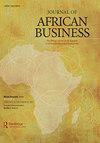情感和计算自我利益在信任感知中的作用——以乳制品价值链为例
IF 1.8
Q3 BUSINESS
引用次数: 0
摘要
参与者之间的信任在合同决策和合作社成员资格方面发挥着重要作用。然而,人们对理解信任发展和信任感知的决定因素感到担忧。在本文中,信任感知由情感和计算的自身利益以及其他预测因素来解释,即价值链交换中的交易成本。我们假设,情感上的非计算性信任和计算性的利己主义都存在于当地农村经济中,这使得这一背景适合检验我们关于情感联系在价值链上的网络和契约中的重要性的假设。我们使用当地社区的饲养者样本来构建情感非计算性利己主义和计算性利己性成分,并调查这两个指标如何有助于产生信任感知。此外,与机会主义、不确定性和依赖性相关的交易成本对信任感知有很强的影响。研究结果表明,情感上的非计算私利会促进信任感知;尽管有投机取巧的行为和不信任,饲养员还是能够通过亲密的关系建立起可靠的联系。小型奶农可以利用现有的社交网络来控制高昂的交易成本,培养信任,并制定可持续的合同作为协调交易的一种方式。本文章由计算机程序翻译,如有差异,请以英文原文为准。
The Role of Emotion and Calculative Self-Interest in Trust Perception:Case of the Dairy Value Chain
ABSTRACT Trust among actors plays an important role in contracting decisions and cooperative membership. There is, however, a concern to understand trust development and the determinants of trust perception. In this paper, trust perception is explained by emotions and calculative self-interest along with other predictors, namely transaction costs in the value chain exchange. We assume that emotional non-calculative trust and calculative self-interest are both present in local rural economies, making this context appropriate to test our hypothesis regarding the importance of emotional links in networking and contracting along the value chain. We used a sample of breeders in a local community to construct the emotional non-calculative self-interest and the calculative self-interest components and investigated how these two indicators contribute to generate trust perception. In addition, transaction costs related to opportunism, uncertainty and, dependency have strong effect on trust perception. The results provide support that emotional non-calculative self-interest fosters trust perception; despite opportunistic behavior and distrust, breeders are able to build trusty links using close relationships. Smallholder dairy farmers could use existing social networks to control high transaction costs, to foster trust and institute sustainable contracts as a way to coordinate transactions.
求助全文
通过发布文献求助,成功后即可免费获取论文全文。
去求助
来源期刊

Journal of African Business
BUSINESS-
CiteScore
4.60
自引率
10.50%
发文量
36
期刊介绍:
Journal of African Business is the official journal of the Academy of African Business and Development, the largest network of professionals committed to advancement of business development in African nations. JAB strives to comprehensively cover all business disciplines by publishing high quality analytical, conceptual, and empirical articles that demonstrate a substantial contribution to the broad domain of African business. Regardless of the research context, tradition, approach, or philosophy, manuscripts submitted to JAB must demonstrate that the topics investigated are important to the understanding of business practices and the advancement of business knowledge in or with Africa. Particularly, JAB welcomes qualitative and quantitative research papers. JAB is not, however, limited to African-based empirical studies. It searches for various contributions, including those based on countries outside Africa that address issues relevant to African business. Targeted toward academics, policymakers, consultants, and executives, JAB features the latest theoretical developments and cutting-edge research that challenge established beliefs and paradigms and offer alternative ways to cope with the endless change in the business world. Covered areas: Accounting; Agribusiness Management and Policy; Business Law; Economics and Development Policy; Entrepreneurship and Family Business; Finance; Global Business; Human Resource Management; Information and Communications Technology (ICT); Labor Relations; Marketing; Management Information Systems (MIS); Non-Profit Management; Operations and Supply Chain Management; Organizational Behavior and Theory; Organizational Development; Service Management; Small Business Management; Social Responsibility and Ethics; Strategic Management Policy; Technology and Innovation Management; Tourism and Hospitality Management; Transportation and Logistics
 求助内容:
求助内容: 应助结果提醒方式:
应助结果提醒方式:


